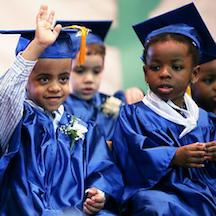 A child’s approach to learning — whether they pay attention, stay organized, follow rules, work independently, etc. — can shape how teachers’ perceive their academic ability. A new study by scholars from Yale University and the University of Notre Dame suggests that these characteristics, called non-cognitive skills, influence teachers’ evaluation of students’ academic aptitude differently depending on a child’s race, ethnicity, and gender.
A child’s approach to learning — whether they pay attention, stay organized, follow rules, work independently, etc. — can shape how teachers’ perceive their academic ability. A new study by scholars from Yale University and the University of Notre Dame suggests that these characteristics, called non-cognitive skills, influence teachers’ evaluation of students’ academic aptitude differently depending on a child’s race, ethnicity, and gender.
The study reveals a variety of racial, ethnic, and gender disparities in the association between first-grade students’ non-cognitive skills and their assessed ability in math and reading. For example, the study found that teachers rated Black students lower in math skills compared to White students with identical non-cognitive abilities and test scores.
The researchers also found that teachers were more likely to rate Black children as below average in math when their non-cognitive skills were below average as compared to their White peers at the same level. This reveals that teachers penalized Black students relative to White students exhibiting similar approaches to learning.
“It is especially distressing that these disparities, which have important implications on children’s academic performance, are emerging as early as the start of kindergarten,” says co-author Grace Kao, the IBM Professor of Sociology and chair of the sociology department at Yale University.
The full study, “Unequal Returns to Children’s Efforts: Racial/Ethnic and Gender Disparities in Teachers’ Evaluations of Children’s Noncognitive Skills and Academic Ability,” was published on the website of the Du Bois Review: Social Science Research on Race. It may be accessed here.













It may be that Black teachers have already harbored preconceived notions about the ability of black students. Could in fact these preconceived ideas may stem from a multitude of variables? One of those variables may be for, example, is knowing that Black teachers are more likely to teach or start their teaching careers at urban schools. May it be that such as previous teaching encounters with young Black students, whom Black teachers thought were unruly, alter these educators perception of Black students? Just a thought.
Just wondering what article you were reading since you assumed the it was alluding to Black teachers harboring prejudices. I suppose you have a different assumption as to why white teachers also have the same prejudices? Maybe Racism?
Did the article state Black teachers rate blacks students?
Thanks
Stony the road we trod… How about encouraging students?